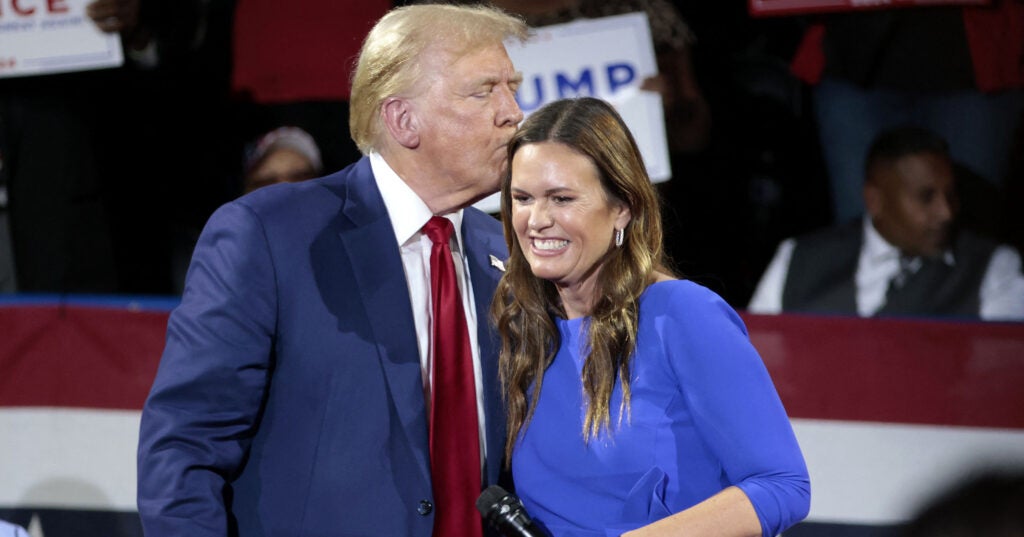One governor is fed up with taxpayers subsidizing junk food—and hurting the long-term health of their fellow Americans.
Food stamps—formally known as the Supplemental Nutrition Assistance Program—“is undermining the health of millions of Americans, on the taxpayer’s dime, by encouraging families to eat highly processed, unhealthy junk food,” writes Arkansas Gov. Sarah Huckabee Sanders in a letter Wednesday to Robert F. Kennedy Jr., President-elect Donald Trump’s pick to lead the Department of Health and Human Service, and to Brooke Rollins, Trump’s pick to lead the Department of Agriculture.
“In fact, soda, unhealthy snacks, candy, and dessert account for nearly 23 percent, or $25 billion, of all SNAP purchases,” said Sanders, a Republican, adding:
Given the relationship between junk food and poor health, our federal food assistance policies are fueling obesity, diabetes, heart disease, hypertension, and a wide range of chronic health conditions across America.
What an important point, especially given that about 12% of Americans rely on food stamps.
Sanders’ request is reasonable: She wants a waiver to allow her to ban junk foods from food stamps in Arkansas. She notes that Arkansas, like most of the United States, is suffering from dietary diseases: One-third of Arkansas residents have diabetes or prediabetes, and 40% are obese, which raises the risk for other diseases and health problems.
It is likely that Kennedy, if he is confirmed by the Senate, will support Sanders’ request. He specifically called for stopping letting “beneficiaries of the Supplemental Nutrition Assistance Program to use their food stamps to buy soda or processed foods.”
“It’s nonsensical for U.S. taxpayers to spend tens of billions of dollars subsidizing junk that harms the health of low-income Americans,” he added in a September column for The Wall Street Journal.
Evidence shows Americans aren’t just using food stamps to buy carrots and chicken.
The second-biggest spending category, after meat and seafood, among food stamp recipients is sweetened beverages, according to a 2016 analysis from the Department of Agriculture that looked at food stamp use in 2011. Recipients spend almost one-tenth their food stamp allocation (9.25%) on sugary drinks.
Additionally, food stamp recipients spent 7% of their budget on desserts, 2% on candy, and 3.4% on salty snacks.
Is that a good use of money designed to help Americans avoid hunger?
In 2014, a group of researchers, including Dr. Jay Bhattacharya—a Stanford University economics professor who later famously argued against the broad COVID-19 lockdowns and is now Trump’s pick to head the National Institutes of Health—looked at what would happen if food stamps could no longer be used to buy soda.
The researchers, whose work was cited by Sanders in her letter, designed a stimulation and predicted that if soda was no longer allowed to be purchased with food stamps, there would be about a 1% decrease in adults with obesity and a 2.3% decrease in adults with type 2 diabetes.
So, no, there’s no indication that banning food stamp use for sodas would solve America’s health crisis. But even this small amount could help—and it would do so without onerous bans.
After all, there’s no reason taxpayer dollars should go to fund soda. Another federal program, WIC, which assists moms and young children, has stringent guidelines on what can be bought, to ensure that it’s used to boost health.
As Kennedy has so passionately spoken about, there’s clearly a health crisis in the United States right now.
“Among American teens, close to 30% are prediabetic. More than 18% of young adults have nonalchoholic fatty liver disease,” he wrote in The Journal.
“Six out of 10 adults in America are living with a chronic illness. …. Rates of kidney disease and autoimmune conditions are going up. Cancer rates among young people are rising. … U.S. life expectancy is markedly lower than in every other developed country, with wide disparities between income classes.”
How bleak.
But this doesn’t have to be America’s permanent diagnosis.
Food stamp rules changes could help nudge the culture in the right direction, as could good government guidelines about nutrition. (Does anyone else remember when we were told to eat a whopping six to 11 servings of carbs a day?) Agriculture subsidies could be rejiggered or eliminated, ending the artificially low cost of some less than optimal foods.
Public schools can start providing more nutritious school lunches. (Yes, Michelle Obama was right.) Local governments could push to develop more walking-friendly neighborhoods, allowing people to more easily integrate movement into their daily lives.
Of course, even if all of these are implemented, health challenges will remain. Big Food’s success in creating maximally craveable food makes it hard to resist, as I know first hand. The stresses of modern life make it even more so.
But let’s not make the perfect the enemy of the better. Sanders’ push is a move in the right direction—and one that conservatives should embrace.
